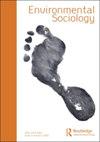践行零浪费:生活方式运动、消费文化、社交媒体网红推广策略
IF 2.8
Q3 ENVIRONMENTAL STUDIES
引用次数: 0
摘要
摘要近十年来,零废物运动越来越受欢迎,社交媒体网红的推广是运动发展的核心。有影响力的人如何推广零浪费的生活方式,以对抗主流的消费规范?他们的策略成功吗?本文将研究网红的生活方式倡导作为社会表现,重点关注他们在社交媒体上的脚本和视觉呈现。本文通过对250条Instagram帖子的内容分析,运用文化社会学的视角来分析零浪费网红的策略和受众的反应。通过证明其可行性、吸引力和与社会政治问题的结合,浪费消费规范的问题化和零废物替代方案的合法化是四个突出的战略。零废物影响者采用文本和视觉脚本、象征性生产手段和现场布置等表演元素来增强真实性并动员零废物实践。与此同时,企业浪费罪魁祸首的问责不足、特权影响者的代表性有限以及消费文化中相互矛盾的嵌入性仍然威胁着他们表现的合法性。这篇文章集中分析了可持续生活方式运动的领导者和他们在社交媒体上的表现,这一点很少被讨论,但越来越重要。它还提供了在社交媒体上推广可持续生活方式的实用策略。关键词:零浪费生活方式运动可持续生活方式消费文化社会绩效社交媒体影响力消费致谢感谢匿名评论者详细而深刻的评论我要感谢Philip Smith博士、Jeffrey Alexander博士以及所有耶鲁大学文化社会学的同事们,他们在我发表这篇文章的过程中给予了我宝贵的建议和极大的支持。我非常感谢零废物社区和给我启发的从业者。披露声明作者没有报告潜在的利益冲突。图片来自:trashisfortossers instagram页面,零浪费的书封面:简单的生活技巧,大幅减少你的垃圾,johnson.html ' title= " Ctrl+点击链接" element-type= " link " ref-type= " DOI " aid= " 1545y2i0x763v8a " icoretag= " uri " ia_version= " 0 " >https://zerowastemegan.weebly.com/bea-johnson.html, https://money.com/savings-eliminating-plastic-money-tips/2。其他术语包括环境/绿色/生态友好的生活方式,指的是我在这里试图捕捉的相同结构,这是一种旨在减少对环境影响的生活方式。可持续的生活方式包括亲环境行为、可持续消费、反消费、自愿简朴、素食主义、纯素食主义等子类。https://www.zerowaste.com/blog/the-top-ten-zero-waste-influencers-in-the-world-today/4。https://www.trvst.world/sustainable-living/eco-friendly/zero-waste-influencers/5。https://www.ecomasteryproject.com/zero-waste-influencers/6。零废物之家在2020年6月之后停止了发帖,因此此后的帖子无法用于分析。最近的帖子下的评论显示,比娅·约翰逊从那以后就中断了所有的社交媒体。我也将把这一现象包括在我的讨论中。谷歌的搜索结果显示,Anamarie Shreeves是Instagram账户zerowastehabesha的创始人,但在Instagram页面上,Freweyni Asress似乎是目前的账户运营者。作者在写作期间(2022年10月)出席了罗布·格林菲尔德在耶鲁大学农场发表的公开演讲。作者简介吕丹宁,中国环境社会科学研究员。她拥有耶鲁大学环境科学硕士学位,惠顿学院社会学学士学位和环境科学学士学位。她的研究主要集中在环境可持续性社会变革的原因和方式,尤其关注基层环保主义、公民消费者的可持续实践以及相应的制度变革。他的研究领域包括中国城市社区花园、零浪费生活方式运动、气候变化公众认知和政策支持。长期致力于减少消费废物、环境正义、气候传播和中国社会等方面的研究。本文章由计算机程序翻译,如有差异,请以英文原文为准。
Performing zero waste: lifestyle movement, consumer culture, and promotion strategies of social media influencers
ABSTRACTZero waste movement has been gaining popularity in the recent decade and social media influencers’ promotion is central to movement growth. How do influencers popularize zero waste lifestyle practices that counter the dominant consumption norms? Are their strategies successful? This article examines influencers’ lifestyle advocacy as social performance, focusing on their scripts and visual presentations to social media audience. Based on content analysis of 250 Instagram posts, this article uses a cultural sociology lens to analyze zero waste influencers’ strategies and the audience responses. Problematization of wasteful consumption norms and legitimization of zero waste alternatives through demonstrating its feasibility, attractiveness, and integration with socio-political concerns are four prominent strategies. Zero waste influencers employ performance elements such as textual and visual scripts, means of symbolic production, and mise-en-scene to enhance authenticity and mobilize zero waste practices. Meanwhile, insufficient accountability of corporate waste culprits, limited representativeness of the privileged influencers, and contradictory embeddedness in consumer culture still threaten the legitimacy of their performance. This article centers the analysis of sustainable lifestyle movement leaders and their social media presentation, which have been little discussed but increasingly important. It also provides practical strategies for promoting sustainable lifestyle on social media.KEYWORDS: zero wastelifestyle movementsustainable lifestyleconsumer culturesocial performancesocial media influencerconsumption AcknowledgementI express deep gratitude to the anonymous reviewers for their detailed and insightful comments. I want to thank Dr. Philip Smith, Dr. Jeffrey Alexander, and all cultural sociology colleagues at Yale who have given valuable advice and supported me greatly during the publishing of this article. I am grateful for the zero waste community and practitioners who inspire me.dgments.Disclosure statementNo potential conflict of interest was reported by the author(s).Notes1. Pictures from: trashisfortossers instagram page, book cover of zero waste: Simple Life Hacks to Drastically Reduce Your Trash, johnson.html’ title=“Ctrl+Click to follow link” element-type=“link” ref-type=“DOI” aid=“1s45y2i0x763v8a” icoretag=“uri” ia_version=’0”>https://zerowastemegan.weebly.com/bea-johnson.html, https://money.com/savings-eliminating-plastic-money-tips/2. Other terms including environmental/green/eco-friendly lifestyle refer to the same construct that I try to capture here, which is a lifestyle that intends to reduce environmental impact. Sustainable lifestyle entails subcategories including pro-environmental behaviors, sustainable consumption,anti-consumption, voluntary simplicity, vegetarianism, veganism etc.3. https://www.zerowaste.com/blog/the-top-ten-zero-waste-influencers-in-the-world-today/4. https://www.trvst.world/sustainable-living/eco-friendly/zero-waste-influencers/5. https://www.ecomasteryproject.com/zero-waste-influencers/6. Zerowastehome stopped posting after June 2020, so posts were not available for analysis after that. Comments under the most recent post show that Bea Johnson had taken a hiatus from all social media since then. I will include this phenomenon in my discussion as well.7. The google search results claim that Anamarie Shreeves is the founder of Instagram account zerowastehabesha, but on the Instagram page Freweyni Asress appears to be the current account runner.8. The author was present at a public talk that Rob Greenfield gave at Yale University Farm during the time of writing (October 2022).Additional informationNotes on contributorsDanning LuDanning Lu is an environmental social science researcher from China. She holds MSc in environmental science from Yale University, BA in sociology and BS in environmental science from Wheaton College (IL). Her work focuses on the why and how of social change toward environmental sustainability, with particular interests in grassroots environmentalism, sustainable practices of citizen-consumers, and corresponding system change. Lu has researched community gardens in urban China, zero waste lifestyle movement, and climate change public perception as well as policy support. She aims to conduct research long-term on topics of consumption waste reduction, environmental justice, climate communication, and Chinese society.
求助全文
通过发布文献求助,成功后即可免费获取论文全文。
去求助
来源期刊

Environmental Sociology
ENVIRONMENTAL STUDIES-
CiteScore
4.60
自引率
12.00%
发文量
34
期刊介绍:
Environmental Sociology is dedicated to applying and advancing the sociological imagination in relation to a wide variety of environmental challenges, controversies and issues, at every level from the global to local, from ‘world culture’ to diverse local perspectives. As an international, peer-reviewed scholarly journal, Environmental Sociology aims to stretch the conceptual and theoretical boundaries of both environmental and mainstream sociology, to highlight the relevance of sociological research for environmental policy and management, to disseminate the results of sociological research, and to engage in productive dialogue and debate with other disciplines in the social, natural and ecological sciences. Contributions may utilize a variety of theoretical orientations including, but not restricted to: critical theory, cultural sociology, ecofeminism, ecological modernization, environmental justice, organizational sociology, political ecology, political economy, post-colonial studies, risk theory, social psychology, science and technology studies, globalization, world-systems analysis, and so on. Cross- and transdisciplinary contributions are welcome where they demonstrate a novel attempt to understand social-ecological relationships in a manner that engages with the core concerns of sociology in social relationships, institutions, practices and processes. All methodological approaches in the environmental social sciences – qualitative, quantitative, integrative, spatial, policy analysis, etc. – are welcomed. Environmental Sociology welcomes high-quality submissions from scholars around the world.
 求助内容:
求助内容: 应助结果提醒方式:
应助结果提醒方式:


